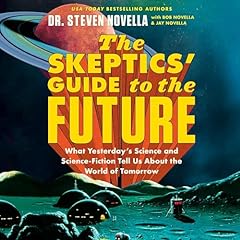
Viral BS
Medical Myths and Why We Fall for Them
No se pudo agregar al carrito
Add to Cart failed.
Error al Agregar a Lista de Deseos.
Error al eliminar de la lista de deseos.
Error al añadir a tu biblioteca
Error al seguir el podcast
Error al dejar de seguir el podcast
 Exclusivo para miembros Prime: ¿Nuevo en Audible? Obtén 2 audiolibros gratis con tu prueba.
Exclusivo para miembros Prime: ¿Nuevo en Audible? Obtén 2 audiolibros gratis con tu prueba.Compra ahora por $20.53
-
Narrado por:
-
Seema Yasmin
-
De:
-
Seema Yasmin
Dissecting the biggest medical myths and pseudoscience, Viral BS explores how misinformation can spread faster than microbes.
Can your zip code predict when you will die? Will testosterone supplements boost your libido? Should you space out childhood vaccines? Does talcum powder cause cancer? Why do some doctors recommend e-cigarettes while other doctors recommend you stay away from them? Health information - and misinformation - is all around us, and it can be hard to separate the two. A long history of unethical medical experiments and medical mistakes, along with a host of celebrities spewing anti-science beliefs, has left many wary of science and the scientists who say they should be trusted. How do we stay sane while unraveling the knots of fact and fiction to find out what we should really be concerned about, and what we can laugh off?
In Viral BS, journalist, doctor, professor, and CDC-trained disease detective Seema Yasmin, driven by a need to set the record straight, dissects some of the most widely circulating medical myths and pseudoscience. Exploring how epidemics of misinformation can spread faster than microbes, Dr. Yasmin asks why bad science is sometimes more believable and contagious than the facts. Each chapter covers a specific myth, whether it has endured for many years or hit the headlines more recently.
©2021 Seema Yasmin (P)2021 HighBridge, a division of Recorded BooksLos oyentes también disfrutaron:




















A breathe of fresh air.
Se ha producido un error. Vuelve a intentarlo dentro de unos minutos.
Interesting but not what I expected
Se ha producido un error. Vuelve a intentarlo dentro de unos minutos.
The title is misleading. Most of these chapters have nothing to do with debunking myths, but with picking sides in various controversial debates, from gun control to fracking.
The chapter headings are all questions that the author will answer for you. There are no surprising answers. When you hear a question, think to yourself, “How would a smug Brit with a particularly condescending attitude towards Americans answer this?” Voila! Now you can skip that chapter.
This wouldn’t really be a problem if it were not for the shifting standards the author applies when rendering her verdicts. Should correlation be confused with causation? Of course not. Unless it’s useful to the argument you agree with.
An example: studies show that teenagers who use e-cigarettes are more likely to try cigarettes than those who don’t. She pretends that this is clear evidence of causation. If you can spot the problem here, don’t bother with this book. It’s full of this nonsense (or downright dishonesty).
The Title’s Only Half Right
Se ha producido un error. Vuelve a intentarlo dentro de unos minutos.


